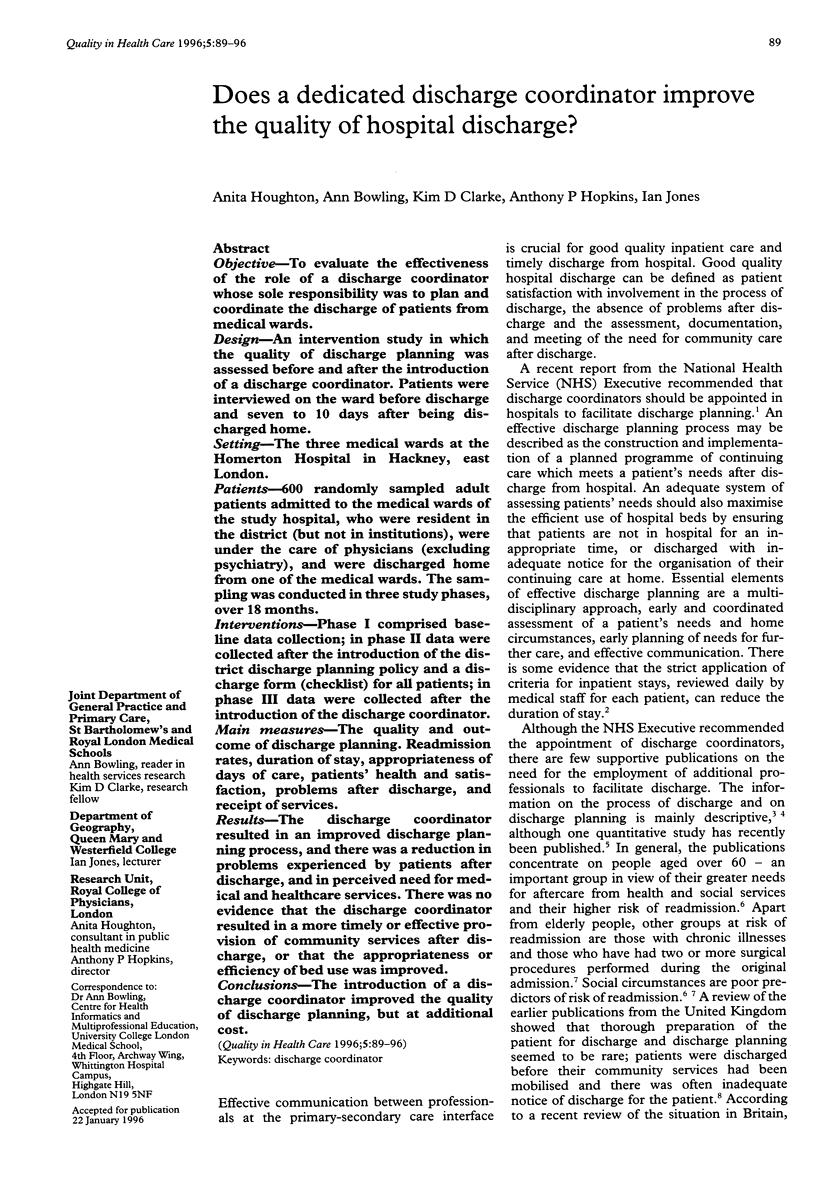Does a dedicated discharge coordinator improve the quality of hospital discharge? (original) (raw)
Abstract
OBJECTIVE--To evaluate the effectiveness of the role of a discharge coordinator whose sole responsibility was to plan and coordinate the discharge of patients from medical wards. DESIGN--An intervention study in which the quality of discharge planning was assessed before and after the introduction of a discharge coordinator. Patients were interviewed on the ward before discharge and seven to 10 days after being discharged home. SETTING--The three medical wards at the Homerton Hospital in Hackney, East London. PATIENTS--600 randomly sampled adult patients admitted to the medical wards of the study hospital, who were resident in the district (but not in institutions), were under the care of physicians (excluding psychiatry), and were discharged home from one of the medical wards. The sampling was conducted in three study phases, over 18 months. INTERVENTIONS--Phase I comprised base line data collection; in phase II data were collected after the introduction of the district discharge planning policy and a discharge form (checklist) for all patients; in phase III data were collected after the introduction of the discharge coordinator. MAIN MEASURES--The quality and out come of discharge planning. Readmission rates, duration of stay, appropriateness of days of care, patients' health and satisfaction, problems after discharge, and receipt of services. RESULTS--The discharge coordinator resulted in an improved discharge planning process, and there was a reduction in problems experienced by patients after discharge, and in perceived need for medical and healthcare services. There was no evidence that the discharge coordinator resulted in a more timely or effective provision of community services after discharge, or that the appropriateness or efficiency of bed use was improved. CONCLUSIONS--The introduction of a discharge coordinator improved the quality of discharge planning, but at additional cost.

Selected References
These references are in PubMed. This may not be the complete list of references from this article.
- Beardshaw V., Gordon P., Plamping D. Primary care development zones. BMJ. 1993 Jan 30;306(6873):323–325. doi: 10.1136/bmj.306.6873.323. [DOI] [PMC free article] [PubMed] [Google Scholar]
- Bowling A., Betts G. From hospital to home, two. Communication on discharge. Nurs Times. 1984 Aug 8;80(32):31–33. [PubMed] [Google Scholar]
- Burnam M. A., Wells K. B., Leake B., Landsverk J. Development of a brief screening instrument for detecting depressive disorders. Med Care. 1988 Aug;26(8):775–789. doi: 10.1097/00005650-198808000-00004. [DOI] [PubMed] [Google Scholar]
- Hodkinson H. M. Evaluation of a mental test score for assessment of mental impairment in the elderly. Age Ageing. 1972 Nov;1(4):233–238. doi: 10.1093/ageing/1.4.233. [DOI] [PubMed] [Google Scholar]
- Holloway J. J., Medendorp S. V., Bromberg J. Risk factors for early readmission among veterans. Health Serv Res. 1990 Apr;25(1 Pt 2):213–237. [PMC free article] [PubMed] [Google Scholar]
- Jitapunkul S., Pillay I., Ebrahim S. The abbreviated mental test: its use and validity. Age Ageing. 1991 Sep;20(5):332–336. doi: 10.1093/ageing/20.5.332. [DOI] [PubMed] [Google Scholar]
- Maguire P. A., Taylor I. C., Stout R. W. Elderly patients in acute medical wards: factors predicting length of stay in hospital. Br Med J (Clin Res Ed) 1986 May 10;292(6530):1251–1253. doi: 10.1136/bmj.292.6530.1251. [DOI] [PMC free article] [PubMed] [Google Scholar]
- Mamon J., Steinwachs D. M., Fahey M., Bone L. R., Oktay J., Klein L. Impact of hospital discharge planning on meeting patient needs after returning home. Health Serv Res. 1992 Jun;27(2):155–175. [PMC free article] [PubMed] [Google Scholar]
- Moss F., McNicol M. Secondary care beyond Tomlinson: an opportunity to be seized or squandered? BMJ. 1992 Nov 14;305(6863):1211–1214. doi: 10.1136/bmj.305.6863.1211. [DOI] [PMC free article] [PubMed] [Google Scholar]
- Waters K. R. Outcomes of discharge from hospital for elderly people. J Adv Nurs. 1987 May;12(3):347–355. doi: 10.1111/j.1365-2648.1987.tb01341.x. [DOI] [PubMed] [Google Scholar]
- Weissman J. S., Stern R. S., Epstein A. M. The impact of patient socioeconomic status and other social factors on readmission: a prospective study in four Massachusetts hospitals. Inquiry. 1994 Summer;31(2):163–172. [PubMed] [Google Scholar]